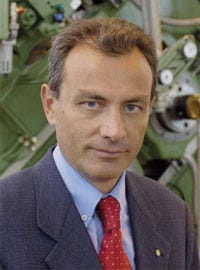Italy continues to punch well above its weight in the plastics industry, with a solid ranking as one of the top-five plastics processing machine manufacturing countries, as well as home to a strong processing and moldmaking base. With Plast ’09 in Milan – the second-largest pure plastics trade show in Europe – held late this month, it seemed an opportune moment to speak with Riccardo Comerio, president of Italy’s Assocomoplast industry trade group and MD of his family’s company, Comerio Ercole.
March 11, 2009
Italy continues to punch well above its weight in the plastics industry, with a solid ranking as one of the top-five plastics processing machine manufacturing countries, as well as home to a strong processing and moldmaking base.
With Plast ’09 in Milan – the second-largest pure plastics trade show in Europe – held late this month, it seemed an opportune moment to speak with Riccardo Comerio, president of Italy’s Assocomoplast industry trade group and MD of his family’s company, Comerio Ercole.
|
MPW: Italian plastics processing equipment makers have traditionally been in the hands of entrepreneurs and their families. Considering the present global financial situation, do you see this changing as pure financial investors entering the market?
Comerio: The Italian manufacturing companies of plastics and rubber machinery were founded, and are still mainly managed, by families of entrepreneurs. It is a typical Italian model that, in many occasions, has allowed our companies to face and get over critical periods. One example is the company with my family’s name, founded in 1885 by an ancestor of mine, and still active globally in our specific market. There are many examples. This direct management also helps strengthen the customers’ confidence, those that appreciate the continuity in the commercial relationship. Of course, there are also examples of manufacturers that were or are held by investment funds and are run by managers. However, these few cases have maybe limited advantage of the “tailor-made” relationship.
MPW: Italian plastics processing equipment traditionally has attracted buyers seeking European quality at a price lower than machinery made by German, Swiss, Japanese, or Austrian competitors. In some cases Far Eastern, in particular Chinese, machine makers are targeting this same market with substantially lower prices than Italian producers can offer. Does Assocomoplast have any particular strategy to aid Italian producers protect their market share?
Comerio: As in all sectors and all over the world, there are good and bad designers and manufacturers, but the Italian average is for sure closer to the German, Swiss and Austrian high technology, with respect to the low-cost tech of the Far East. Unfortunately, there are competitors that enjoy a better reputation than their real quality deserves and others, like many Italians, that sell machinery all over the world, have satisfied customers ... In such context, for many years, Assocomoplast has been spreading all around the world the positive image of the Italian companies.
MPW: Should the Italian government or the EU do more to aid foreign buyers of Italian processing equipment to get bank loans/letters of credit to finalize investments?
Comerio: This is indeed our biggest issue in the international competition. The so-called “Country System” does not provide the exporters the same financial and promotional supports enjoyed by the German and French – and in particular Austrian and Spanish – competitors. Together with the other Associations of the manufacturing sector, for many years we have been trying to sensitize the Italian political authorities, but the improvements we have so far recorded are not enough. In light of the present financial turmoil, we trust the real economy – which we belong to – will be more considered (for this aid) rather than the financial economy, which does not produce wealth.
MPW: Where are Italian machine makers seeing growth in demand for their goods: domestic, within the EU, Eastern Europe and the CIS countries, the Middle East, Latin America, NAFTA, Far East? Or in all of these to some extent?
Comerio: Our export reaches all the continents but our main market is the European one, which, in 2007, absorbed 63% of our export sales of plastics and rubber machinery. In the top-10 rankings we find all the main markets of the world. —[email protected]
About the Author(s)
You May Also Like



